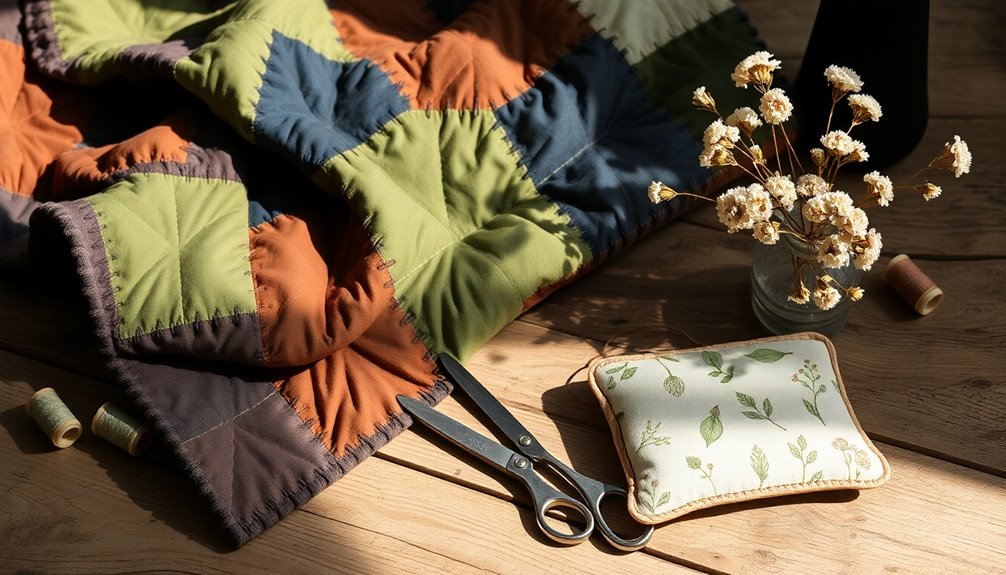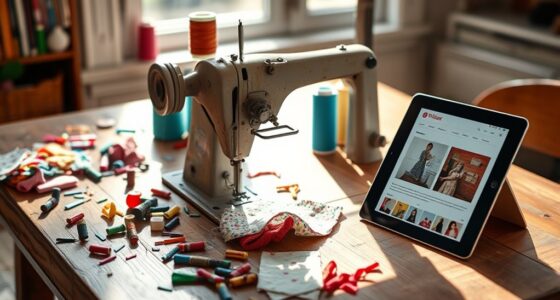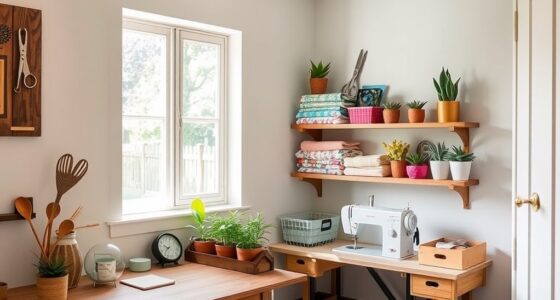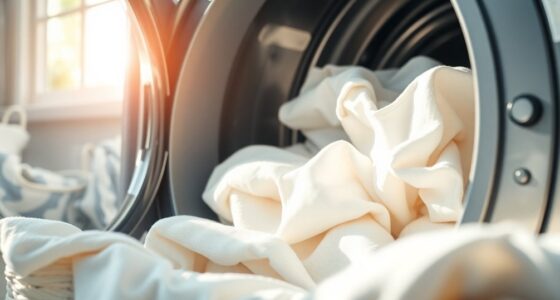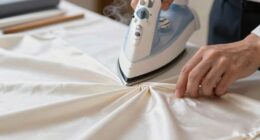Eco-friendly threads are essential for crafting a sustainable sewing lifestyle. By choosing threads made from recycled materials, you reduce textile waste and support eco-conscious practices. These threads not only promote a circular economy but also enhance the durability and softness of your creations. Plus, you'll feel good knowing you're contributing to a healthier planet. Explore the various eco-friendly options available and discover the potential they hold for your projects and wardrobe. There's so much more to explore!
Key Takeaways
- Eco-friendly threads, like Coats EcoVerde, are made from 100% recycled materials, promoting sustainability in sewing practices.
- Using hypoallergenic and chemical-free eco-friendly threads enhances comfort while reducing environmental impact.
- Prioritizing certified threads ensures compliance with safety standards and supports fair labor practices in the textile industry.
- Incorporating eco-friendly materials fosters a circular economy, minimizing waste and encouraging responsible consumption.
- Engaging in community initiatives and workshops promotes awareness and sharing of eco-friendly sewing techniques and resources.
The Importance of Sustainable Sewing Practices
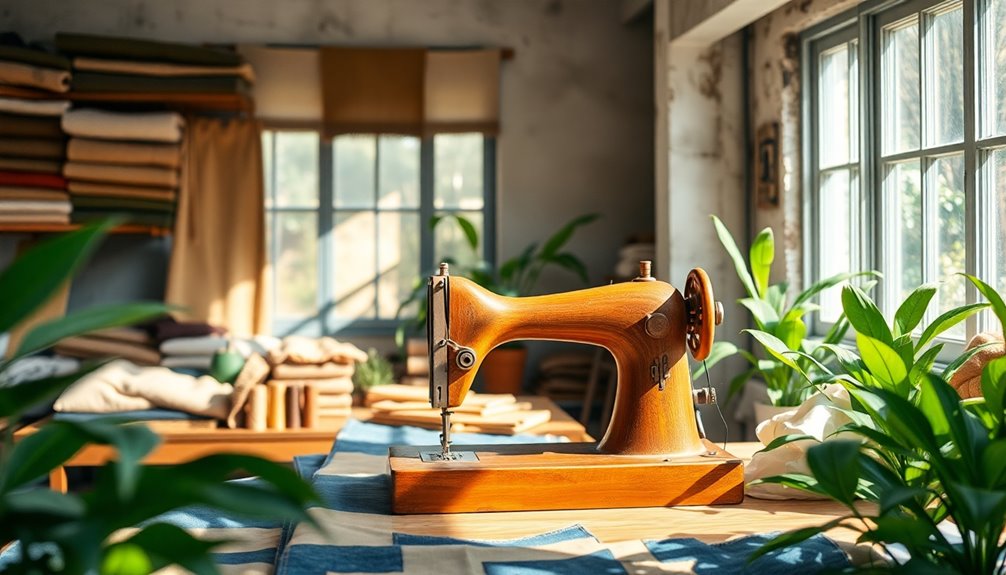
When you embrace sustainable sewing practices, you're not just creating beautiful garments; you're also taking a stand for the environment.
By upcycling old clothing, you greatly reduce the amount of textile waste, giving a second life to materials that would otherwise fill landfills. Choosing eco-friendly fabrics like organic cotton and Tencel enhances your creations while minimizing environmental impact.
Implementing no-waste design techniques promotes innovative solutions and guarantees efficient use of fabric, further reducing landfill contributions. Opting for threads and materials from certified eco-friendly brands ensures compliance with safety standards and supports ethical production.
Finally, focusing on mindful consumption encourages you to prioritize quality over quantity, fostering a sustainable wardrobe that aligns with slow fashion principles. Additionally, the negative effects of wood smoke pollutants highlight the importance of using environmentally friendly materials in your sewing projects.
AMANN's Lifecycle and Recycled Product Lines
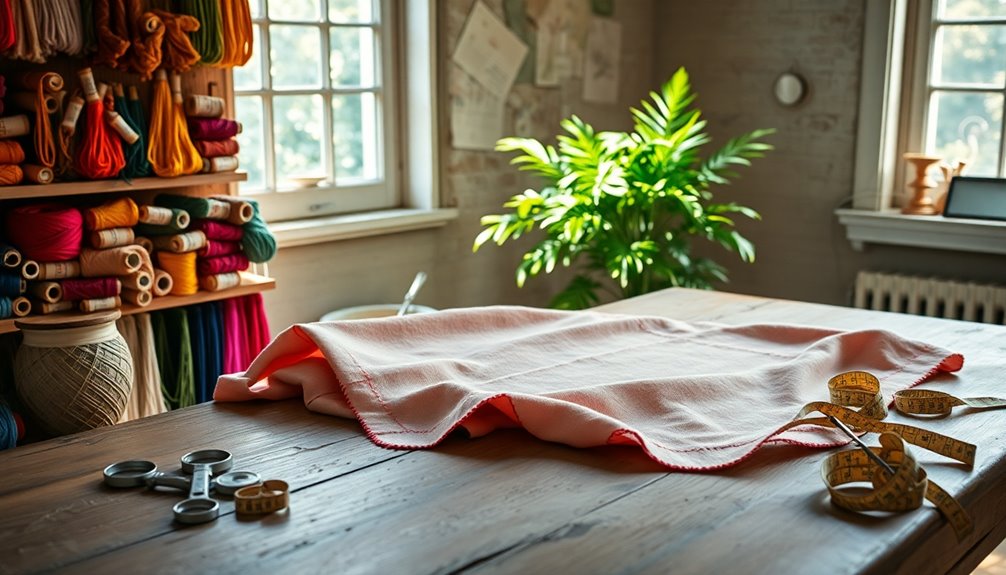
When you choose AMANN's Lifecycle Product Line, you're opting for threads that meet Cradle to Cradle Certified® Gold standards, ensuring sustainability at every stage.
Their Recycled Product Line, made from 100% recycled materials like PET bottles, guarantees high quality while supporting eco-friendly practices.
With all products designed for composting or reprocessing, you're actively contributing to a circular economy. Additionally, this commitment aligns with principles of self-regulation that promote responsible consumer behavior and environmental stewardship.
Lifecycle Product Benefits
AMANN's Lifecycle and Recycled Product Lines offer significant benefits, particularly in promoting sustainable practices within the textile industry.
By choosing these options, you're embracing a future where waste is minimized and resources are valued.
- Experience products that are Cradle to Cradle Certified® Gold, designed for endless recycling.
- Enjoy threads made from 100% recycled PET bottles, maintaining high-quality standards.
- Contribute to a circular economy, with items that are 100% compostable or reprocessable.
With AMANN, you're not just sewing; you're supporting sustainable materials and responsible production.
The Recycled line is GRS certified, ensuring the integrity of recycling processes. Additionally, the use of 100% recycled PET bottles in thread production highlights a significant innovation in eco-friendly materials.
Recycled Materials Quality
Opting for recycled materials doesn't mean compromising on quality. AMANN's Recycled Product Line features threads made from 100% high-quality recycled polyester continuous filament, primarily sourced from recycled PET bottles.
This impressive line nearly matches the quality of standard products, ensuring you can sew with confidence. Each product is certified by the Global Recycled Standard (GRS), guaranteeing responsible sourcing and production practices.
You'll also appreciate that all recycled threads contribute to a circular economy, minimizing waste and promoting consistent recycling management. The environmental impact of AMANN's recycled threads is remarkably positive, produced without harmful substances and meeting stringent safety standards like STANDARD 100 by OEKO-TEX®.
Additionally, opting for raw food diets can inspire creative ways to repurpose fabric scraps and reduce waste in sewing projects. Choose AMANN and make a quality statement while caring for the planet.
Upcycling: Transforming Old Into New
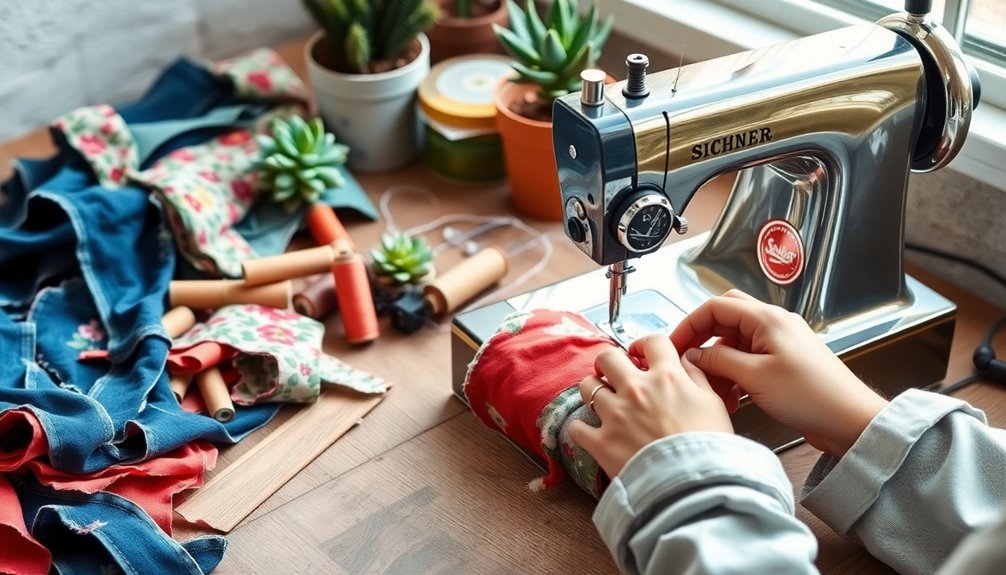
Upcycling breathes new life into worn-out garments, allowing you to creatively transform discarded items into functional treasures. By embracing upcycling, you're not only reducing waste but also enhancing your sewing and design skills.
Imagine:
- Turning old jeans into stylish tote bags.
- Repurposing faded curtains into cozy pillow covers.
- Crafting unique dresses from vintage ties.
Participating in challenges like the Upcycle Challenge by Threads sparks your creativity, showing how preworn items can be reimagined. Each project showcases your personal expression while contributing to sustainability in fashion.
Upcycling limits your carbon footprint and proves that even the most worn items hold potential. So, gather your old clothes and let your imagination run wild!
Embracing Eco-Friendly Fabrics
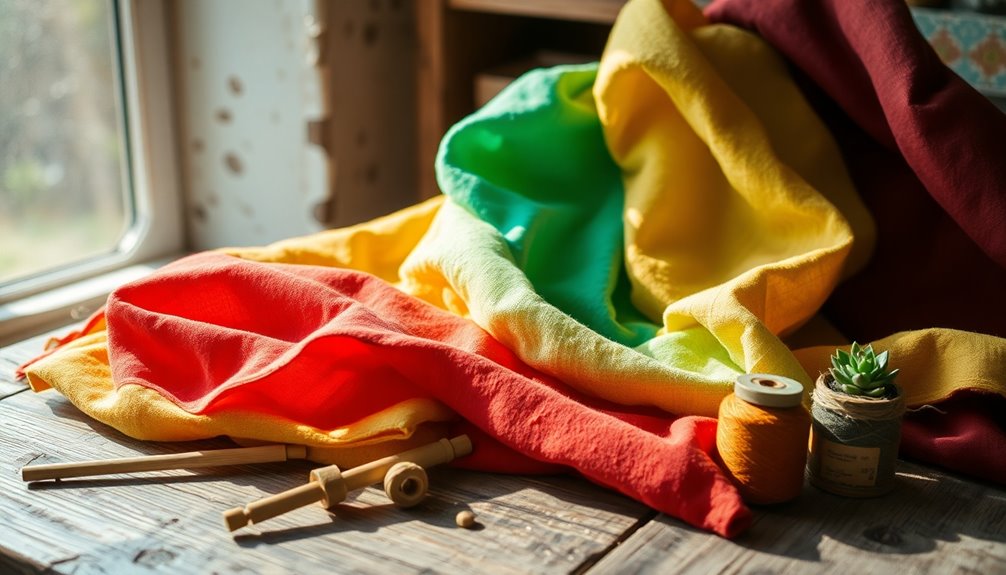
As you explore the world of sustainable sewing, embracing eco-friendly fabrics can make a significant difference in your creations.
Fabrics like organic cotton, bamboo, hemp, and Tencel are sourced sustainably, minimizing environmental impact while offering higher quality and softness. These materials enhance comfort and breathability, making them perfect for various projects.
Plus, many eco-friendly fabrics are hypoallergenic and free from harmful chemicals, promoting health for sensitive skin. This makes them an excellent choice for individuals with allergies or skin sensitivities, as they reduce the risk of irritation. Additionally, by choosing ecofriendly fabric options, consumers can contribute to a more sustainable future, supporting practices that minimize environmental impact. As more brands embrace these materials, the availability of stylish and comfortable clothing made from eco-friendly textiles continues to grow.
By choosing these sustainable options, you not only elevate your sewing projects but also contribute to a growing awareness of environmental issues.
Prioritizing eco-friendly fabrics helps shift the sewing industry toward more sustainable practices, allowing you to craft with purpose and responsibility.
Benefits of Using Eco-Friendly Threads
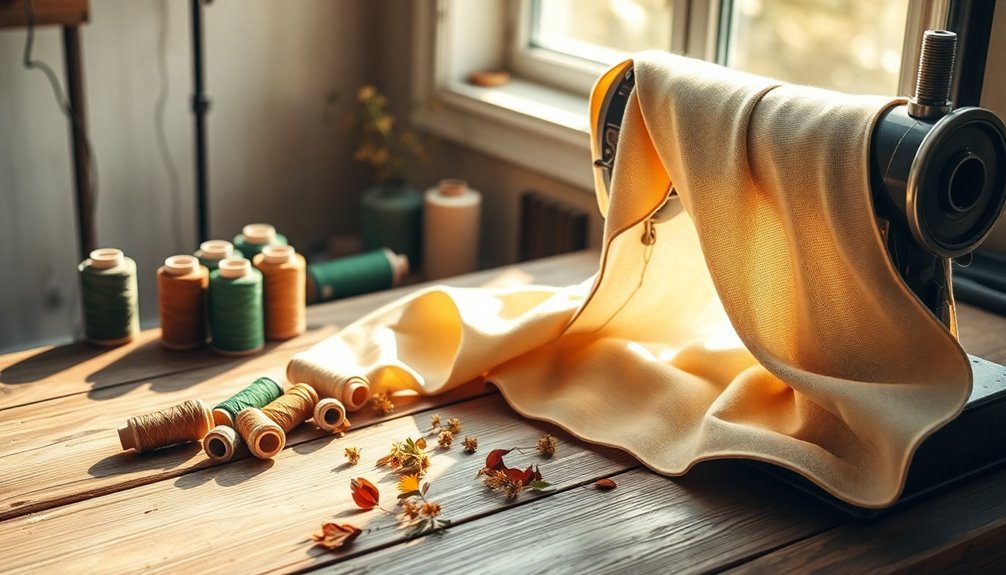
When you choose eco-friendly threads for your sewing projects, you're not just making a fashion statement; you're also making a positive impact on the environment.
By using these threads, you greatly reduce textile waste and encourage a circular economy. Here are some benefits you'll enjoy:
- Durability: Eco-friendly threads offer strong performance, enhancing the lifespan of your garments.
- Safety: Many threads are certified free from harmful substances, making them perfect for sensitive applications like baby products.
- Ethical production: Supporting sustainable brands promotes fair labor practices and environmental responsibility.
Incorporating eco-friendly threads with your eco-friendly fabrics not only elevates your projects but also aligns with your values for a sustainable sewing lifestyle.
Techniques for No-Waste Designs
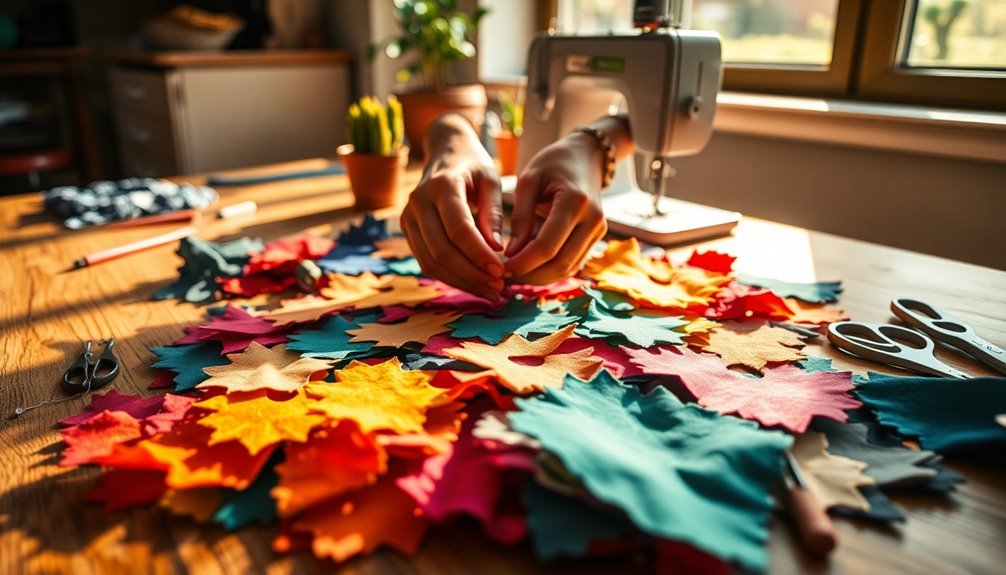
Embracing no-waste design techniques not only helps you make the most of your fabric but also sparks creativity in your sewing projects. By ensuring all pattern pieces fit together seamlessly, you maximize material use and minimize waste in garment production.
Techniques like pattern manipulation and strategic layout planning lead to innovative designs that stand out. Incorporating modular designs lets you create versatile pieces that can be easily altered, reducing the need for new materials down the line.
Don't forget to utilize fabric scraps for smaller projects or accessories—this showcases your resourcefulness while further supporting sustainable practices. Engaging in zero-waste sewing methods fosters mindful consumption and enhances your problem-solving skills, making your sewing journey both eco-friendly and fulfilling. Additionally, understanding proper diet for your sewing materials, such as choosing organic fabrics, can further support sustainability in your projects.
Mindful Consumption in Fashion

How can you make a positive impact on the environment through your fashion choices? Embracing mindful consumption is key.
By focusing on quality over quantity, you can create a sustainable wardrobe that lasts longer and reduces waste. Consider these practices:
- Choose eco-friendly fabrics like organic cotton, bamboo, and Tencel.
- Invest in high-quality, durable pieces that align with slow fashion principles.
- Upcycle old clothing into unique items, fostering creativity and personal expression.
Supporting eco-friendly brands with sustainable and ethical practices, like those certified by GRS and OEKO-TEX, drives collective responsibility in the fashion industry. Additionally, incorporating natural remedies such as honey can enhance your overall well-being while promoting a sustainable lifestyle.
Connecting With the Sustainable Sewing Community

By connecting with the sustainable sewing community, you can enhance your skills while building relationships with others who share your passion for eco-friendly practices.
Joining local sewing circles and workshops fosters connections with like-minded individuals, allowing you to share ideas and techniques.
Online platforms and social media groups abound with resources dedicated to eco-friendly sewing, offering inspiration and support for your projects.
Participate in community challenges, like upcycling competitions, to ignite your creativity and promote material reuse.
These communities often prioritize exchanging eco-friendly fabric sources, helping you make informed choices.
Collaborating on group projects amplifies the impact of sustainable practices, showcasing your creativity and innovation in sewing.
Immerse yourself and discover the vibrant world of sustainable sewing!
Inspiring Projects for Eco-Conscious Creators

As you connect with the sustainable sewing community, you'll find a wealth of inspiring projects that encourage eco-conscious creativity.
Embrace upcycling by transforming old jeans into chic tote bags or crafting unique jackets from vintage fabrics.
Consider these ideas to contribute to a greener planet:
- Create a sundress using zero-waste design practices, fitting all pattern pieces together perfectly.
- Repurpose vintage table linens into stylish garments or decorative items, sourced from local thrift stores.
- Use eco-friendly threads like AMANN's Saba Recycled, made from 100% recycled PET bottles, to enhance your projects without compromising quality.
Incorporating eco-friendly practices into your sewing not only benefits the environment but also aligns with the values of many modern consumers.
These projects not only reduce textile waste but also spark your creativity, allowing you to sew sustainably and passionately.
The Future of Sustainable Sewing
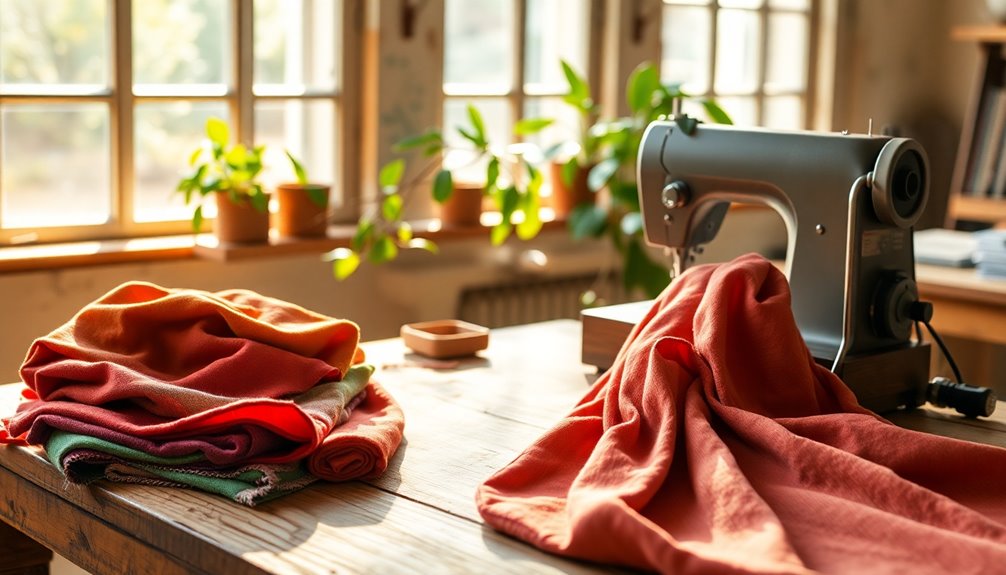
As you explore the future of sustainable sewing, you'll notice a growing emphasis on innovative eco-friendly fabrics that align with your values.
Engaging with your community can amplify these efforts, fostering collaboration and creativity in using sustainable materials.
Together, you can help shape a more responsible and stylish approach to sewing.
Innovations in Sustainable Fabrics
While many traditional fabrics contribute to environmental degradation, innovations in sustainable fabrics are transforming the sewing landscape.
You'll find eco-friendly options like organic cotton, bamboo, and hemp thriving, all thanks to their sustainable sourcing.
- Coats EcoVerde offers 100% recycled polyester continuous filament threads.
- Eco-friendly fabrics deliver remarkable softness and breathability.
- Certifications like Global Recycled Standard guarantee responsible sourcing.
With advancements like EcoVerde threads, you can enjoy high-performance features such as enhanced abrasion resistance and color fastness.
These innovations not only promote sustainability but also provide you with superior materials for your projects. Additionally, the shift towards circular economy practices is encouraging the development of even more eco-friendly textile options.
Embracing these sustainable fabrics will make your sewing lifestyle more eco-conscious and enjoyable.
Community Engagement in Sewing
How can community engagement elevate your sewing practice? By joining local sewing circles or online forums, you can exchange sustainable practices and tips, fostering a commitment to eco-friendly crafting.
Collaborating on upcycling projects sparks creativity and reduces textile waste, while workshops led by experts teach essential sustainable sewing techniques. These experiences enhance your skills and promote environmentally conscious choices in your projects.
Community events often highlight the benefits of eco-friendly fabrics, encouraging you to prioritize sustainable brands. Sharing your successes and challenges with fellow members inspires everyone to adopt responsible textile consumption habits.
Ultimately, engaging with your sewing community can transform your approach and contribute to a larger movement towards sustainability in the crafting world.
Frequently Asked Questions
What Thread Is Sustainable?
When you're looking for sustainable thread, consider options like AMANN's Saba Recycled and Coats EcoVerde.
These threads are made from 100% recycled materials, primarily PET bottles, and maintain high performance.
You'll also find threads that are compostable or reprocessable, ensuring minimal waste.
Plus, many eco-friendly threads are certified free from harmful substances, making them safe for all kinds of projects, including baby items.
Choosing these threads helps reduce your environmental impact.
How Can We Make Sewing Sustainable?
Imagine transforming your sewing room into a sanctuary of sustainability. You can make sewing sustainable by choosing eco-friendly threads and fabrics, like organic cotton or hemp.
Upcycle old garments into fresh designs, minimizing waste and promoting creativity. Opt for no-waste patterns to utilize every scrap, and support brands with ethical certifications.
What Is the Most Sustainable and Eco-Friendly Fabric?
When you're looking for the most sustainable and eco-friendly fabric, consider options like organic cotton, bamboo, hemp, and Tencel.
Organic cotton's grown without harmful pesticides, while bamboo thrives with minimal water.
Hemp's durability and low resource needs make it a great choice, and Tencel's closed-loop production process minimizes waste.
What Thread Is Biodegradable?
Imagine a garden where threads blossom like flowers, each one designed to return to the earth. Biodegradable threads, made from organic cotton or linen, are your best choice. They decompose naturally, leaving no trace behind.
AMANN's Lifecycle Product Line offers fully compostable options, ensuring you stitch with sustainability in mind. These threads embrace a safer, chemical-free existence, helping you nurture a greener world while you create beautiful pieces.
Conclusion
As you take your final stitches, think about the impact your choices can make. Each thread you use and every fabric you select contributes to a larger story—a story of sustainability and creativity. What if your next project could inspire others to join the movement? Imagine a world where every seam tells a tale of eco-consciousness. The journey doesn't end here; it's just the beginning. Are you ready to make your mark and shape the future of sewing?
